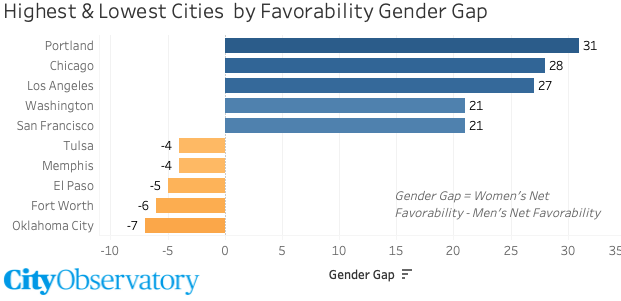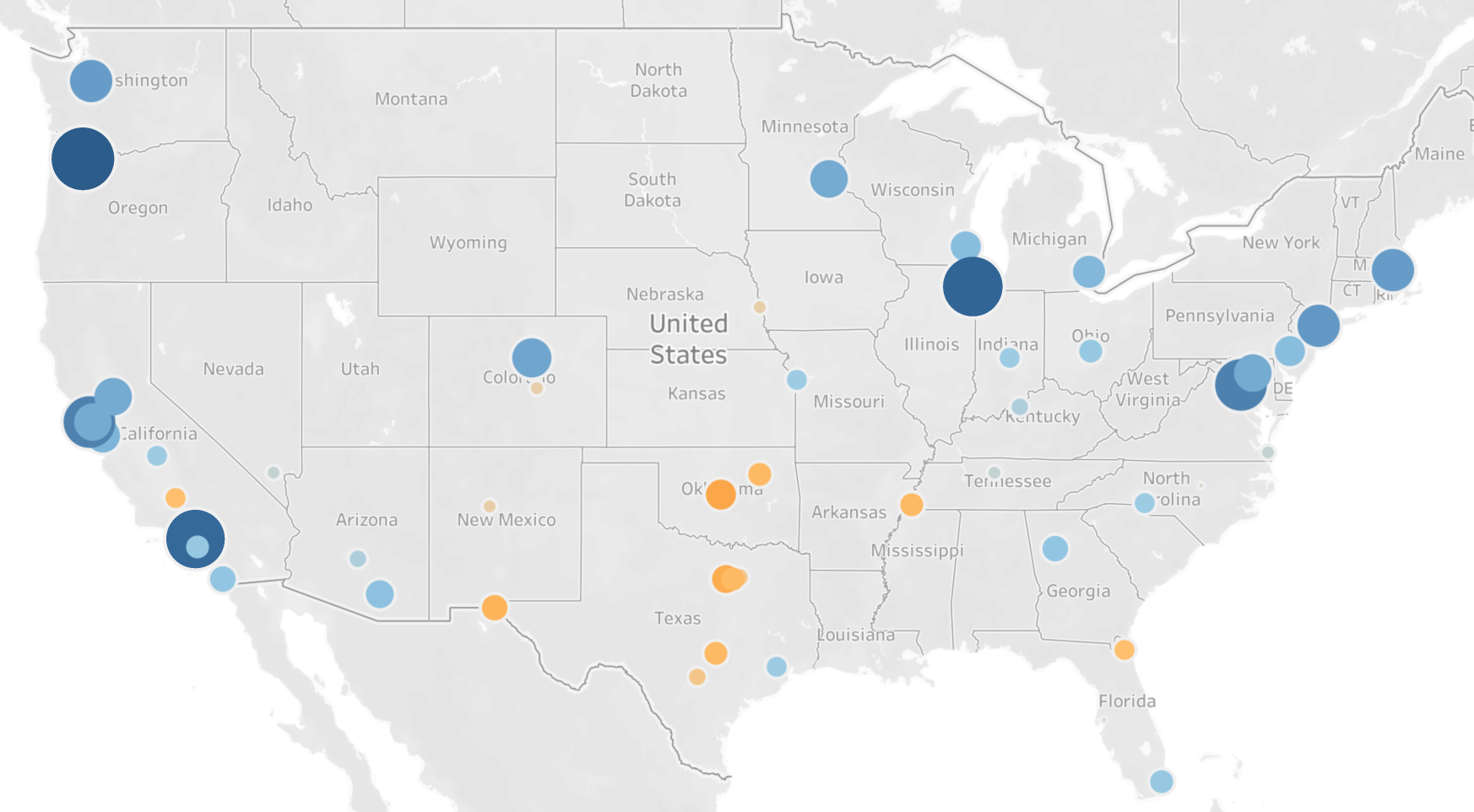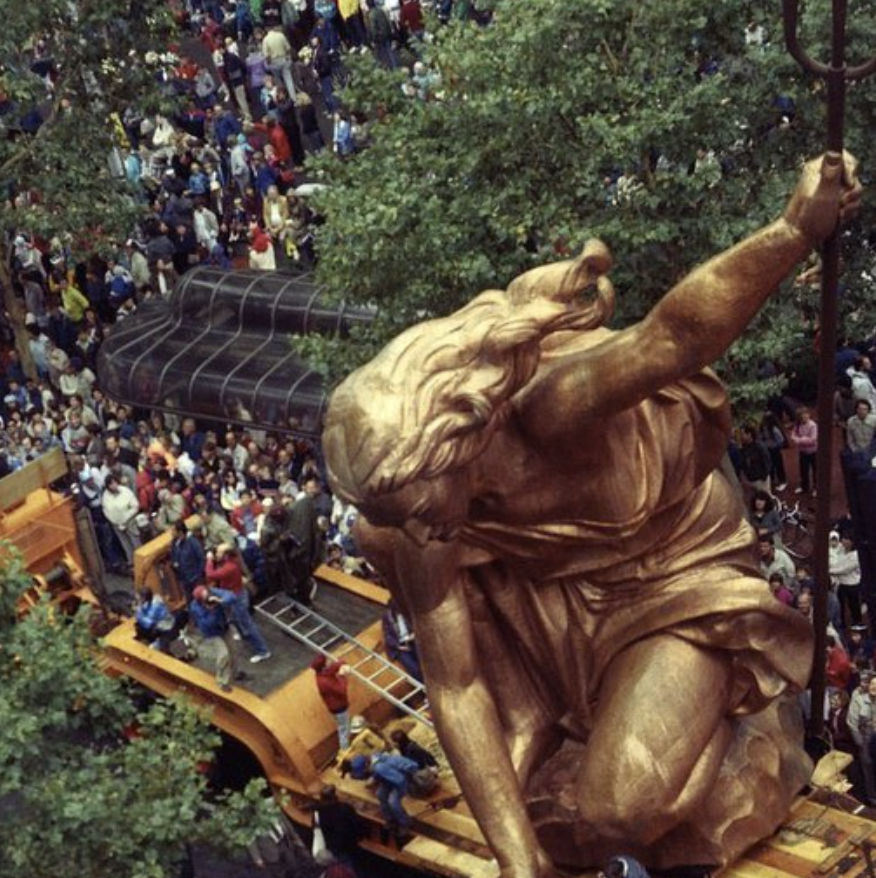Women are from Portland, men are from Oklahoma City
Men and women perceive cities differently: Women like some cities much more than men do; and vice-versa
A new survey of net favorability ratings of cities show Portland and handful of other cities are perceived much more positively by women than men.
Gender differences in perceived favorability of cities vary geographically; overall, women regard Western cities more favorably than men; men regard cities in the South, and especially Texas, more favorably than do women.
A relative handful of cities are regarded similarly by both men and women.
Women view Portland, Chicago, Los Angeles, and San Francisco most favorably, relative to men’s view of the same cities. Nationally, women were about 30 percentage points more likely to rate Portland favorably compared to men; the other four cities had more than 20 percent higher net favorable ratings among women than men. Men had higher net favorability ratings for some cities than women, notably cities in Texas and Oklahoma. The following chart shows the highest and lowest cities for net favorability for women compared to men.
These estimates are drawn from a new survey from YouGov, which asked a representative panel of more than 2,000 Americans about their perceptions of 50 of the nation’s largest cities. While the top line numbers showed Nashville with the most positive rankings, we think it is interesting to explore the differences in perception by gender. Which cities do women rate most highly compared to men?
We re-tabulated the YouGov data to compute the net favorability ratings of each of the 50 cities separately for men and for women. Net favorability just subtracts the number of negative ratings (somewhat or very unfavorable) from the positive ratings (somewhat or very favorable). We then subtract the net favorability rating men give to a city from the net favorability rating women give to a city to show which cities are regarded most favorably by women relative to men: Positive numbers indicate women have a more favorable view of a city than men, negative numbers show men have a more favorable view than women. (The complete results for the 50 cities included in the survey are shown below).
For example, about 40 percent of men surveyed rate Portland either somewhat or very favorably, and 37 percent of men rate it somewhat or very unfavorably. About 46 percent of women rate Portland somewhat or very favorably, and 12 percent rate it somewhat or very unfavorably. The net favorability for men is 3 (40-37), while the net favorability for women is 34 (46-12). When we subtract the men’s net favorability from the women’s net favorability (34-3), we get a gender gap score of 31, meaning women were more about 31 percentage points more likely that men to regard the city favorably, on net.
Overall, women are more likely to have favorable views of cities than men. There are wide variations across cities in net favorability by gender: Women have far more favorable views of some cities than men, and vice-versa. Women viewed 30 cities more favorably than men; men viewed 11 cities more favorably than women, and the remaining nine cities had a negligible difference (2 points or less).
The geographic patterns are interesting: West Coast cities, on average tend to be viewed more favorably by women than men; Southern cities (especially in Texas and Oklahoma) are viewed more favorably by men than by women. Every city in California was viewed more favorably by women than men (except Bakersfield). Every city in Texas was viewed more favorably by men than women (except Houston).
The Gender Gap in City Perceptions
(Blue: Women More Favorable; Yellow Men More Favorable. Circle sizes correspond to size of gender gap)
The survey doesn’t directly reveal why there are these strong gender differences in perceptions of cities, and readers are likely to have their own theories about why men regard some cities less favorably than women. At a minimum the map does seem to lend some credence to the plot of Thelma and Louise.
Portlandia–the statue of a mythical embodiment of the city of Portland.
It’s worth noting that in this survey a majority of these perceptions are based not on actual first hand experience, because only a minority of Americans have visited the cities they rated. Overall, just one city–New York City–had actually been visited by a majority of those surveyed, though Atlanta, Chicago, Las Vegas, Los Angeles had been visited by more than 40 percent of those surveyed. The typical (median) city had been visited by about a quarter of survey respondents. In effect, the survey is reporting the favorability perceptions of people who have never visited a city, and so probably reflects word of mouth, media coverage and other second-hand sources of information. Like so many things, political views color perceptions: Portland and San Francisco, and more recently Los Angeles have all been assailed by President Trump, and are all rated far less favorably by self-identified Republicans and Trump-voters.
Cities ranked by favorability to women



